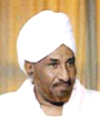INTERVIEW-Sudan peace deal could spark more conflict -Mahdi
By Opheera McDoom
 KHARTOUM, Jan 16 (Reuters) – Sudan’s last elected leader said on Sunday that a deal to end more than two decades of civil war in the south would encourage more people to take up arms because the deal did not have popular support.
KHARTOUM, Jan 16 (Reuters) – Sudan’s last elected leader said on Sunday that a deal to end more than two decades of civil war in the south would encourage more people to take up arms because the deal did not have popular support.
Sadiq al-Mahdi, twice prime minister and leader of the Umma party, historically Sudan’s biggest, told Reuters the deal signed a week ago was incomplete and, if not rectified, would lead to the fragmentation of Africa’s largest country.
“The agreement as it stands does encourage people to seek benefits by military pressure,” Mahdi said in an interview in his home in Khartoum.
“If you say the goodies, the benefits, are going to be simply handed out according to military pressure then you are going to get mounting military pressures which ultimately will divide the country up,” said Mahdi, great-grandson of the charismatic Mahdi who ruled Sudan in the 1880s.
Under the deal between the northern government, dominated by the ruling National Congress Party (NCP), and the southern rebel Sudan People’s Liberation Army (SPLA), the south has a right to a referendum on secession after six and a half years.
Mahdi said the deal did not make unity attractive to southerners, citing the wealth-sharing protocol, which gives the southern administration 50 percent of revenues from oil, which now comes mostly from the south.
He said Sudan’s natural resources should be shared out according to population, but with more funds diverted to the south and other war-affected areas to bridge the development gap and compensate for years of war.
OUSTED IN COUP
He also criticised the power-sharing part of the deal, which says 52 percent of the government will be from the NCP and 28 percent from the SPLA, with other northern parties taking 14 percent and other southerners 6 percent.
“If you talk about 52 percent it should be for the north, not for a party in the north and 28 percent should be for the south, not for a party in the south,” he said. “That way you make the agreement nationally acceptable for others.”
He said unless these and other elements were fixed through a national constitutional or all-party conference, his party would not take part in the interim government before elections scheduled to be held within four and a half years.
Mahdi, ousted as prime minister in a bloodless military coup in 1989 by President Omar Hassan al-Bashir, said he had not decided whether to stand in the elections.
Mahdi said his Umma party wanted two legal systems, non-religious law covering all Sudanese citizens and a separate religious legal system targeting the appropriate communities.
Islamic Sharia law, imposed in 1983, was a catalyst for the southern fighting, which has claimed more than 2 million lives.
The war broadly pitted the Islamist government based in Khartoum against the mainly Christian and pagan south, complicated by issues of oil, ethnicity and ideology.
Mahdi called for immediate action on a separate almost two-year-old rebellion in the remote western region of Darfur, where almost 2 million people have fled their homes and tens of thousands have died.
He advocated a complete change in the area’s administration, to be led by those the people trusted and with a neutral commission to investigate and compensate victims of the violence.
He said the new power-sharing government in Khartoum should deal with Darfur quickly. Otherwise it would cause rifts as both sides had opposing allies in the region.
“If they proceed with the agreement as if Darfur does not exist it will be a provocation which will mean escalation,” he said, adding the SPLA would naturally side with non-Arab tribes in Darfur, while the government would be with the Arab tribes.
